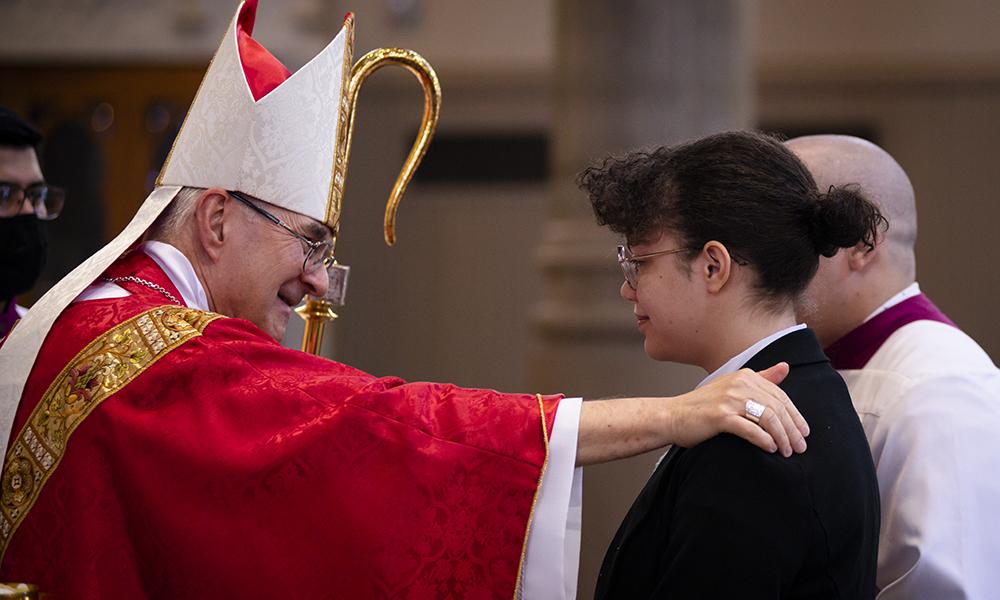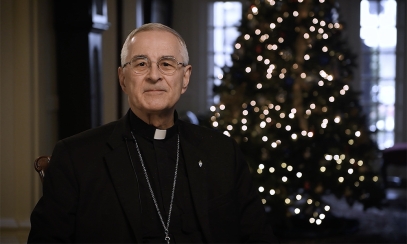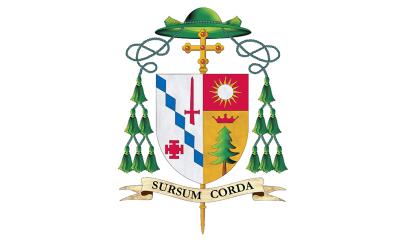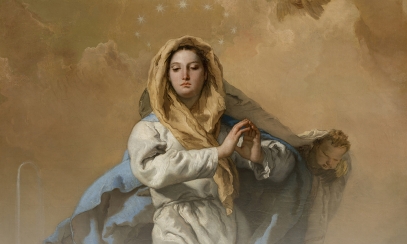
‘Ready to Go Out on Mission’
Cathedral of St. Paul Hosts Diocesan Confirmation
Cathedral of St. Paul Hosts Diocesan Confirmation
On Feb. 12, Bishop Raica celebrated the bilingual Diocesan Confirmation at the Cathedral of St. Paul. The bilingual Diocesan Confirmation is open to anyone who is eligible and needs to receive the sacrament.
On Feb. 12, Bishop Raica celebrated the bilingual Diocesan Confirmation at the Cathedral of St. Paul. The bilingual Diocesan Confirmation is open to anyone who is eligible and needs to receive the sacrament.
My sisters and brothers in Christ, it is my honor to be with you today to celebrate this sacrament of confirmation. You have been preparing to receive the gifts of the Holy Spirit, which are called the “power” of the Holy Spirit without which our lives would be less complete - we would not experience sufficiently the amazing lives that we have been given.
With the current situation in which we find ourselves - the hesitation we have in the facing the future because of uncertainties over the past couple years – we tend to think again about what life means.
At the celebration of the sacrament of confirmation, we are given some strong clues to help us acknowledge the limitations of our past, know the tools available to face our future, and give us a pathway to face life in the present.
As we think about God, in the Most Holy Trinity, it is relatively easy to understand God as Father. OK! I have a dad, so I can grasp the analogy. He is the Creator of the universe.
It is easy to understand God as Son – we know about Jesus as the Son of Mary, the Mother of God. We know about His saving mission in the Gospel. I am a child of my parents, indeed the son of my father and mother. So, I grasp that analogy.
We don’t know a lot about God as Holy Spirit. Spirit seems elusive, hard to grasp. The Spirit is characterized as a breath, the breath of life. Maybe it is something like the glue or love that holds parents or friends or family together. Something, or really Someone, who gives the breath of life. We think about the Spirit as a force and energy that creates, that renews, and, as such, is a “power” that cannot be underestimated. It is more than the power of a certain prescribed knowledge to graduate from school and get a job or political ingenuity to control societies. It is a force or energy given by God to be a new person, a new man, a new woman, a new life that cannot be taken away from me by anyone, not even my parents or the state.
The first reading for confirmation this year recalls what happened in the early Church as the followers of Christ waited for the event of Pentecost. They were reminded, “You will receive the power when the Holy Spirit comes upon you.” And this Holy Spirit – this breath of life, this gust of wind, this event – removed all fear from them, truly making them into what they were meant to become: Apostles and disciples. They became people who belonged to God and each other, yet people who were free to do what they are called to do. They were ready to go out on mission.
Remember, those disciples spent only a couple years with Jesus. Their lives began to change by being with Him, watching Him, listening to Him, asking Him questions. In a real sense, they became captivated / fascinated by a man who told them about themselves and what they could become. They could not remain as they were. They saw and heard things they could not unsee or unhear anymore. It was an event that slowly changed them into becoming something more for which life would be lived in a new way, a different way, a way that would ultimately say, “Without you, O Christ, I cannot even live.”
When you think about it, right after Jesus’ death and resurrection, they huddled together to process everything that was happening. What were they going to do now that Jesus ascended back to Heaven? Then, the event of Pentecost occurred and changed their lives. They were sent out to the ends of the earth to proclaim Christ is alive!
To do so, they didn’t have an organized program like parochial school or PSR. So many people they met had never even heard about Christ. There was no written New Testament at the time. There was no social media, TV, radio, or telephone. There were no workshops or institutions of higher learning to help pastoral leaders. There were no churches or basilicas built yet. There was only a growing number of people who lived fully and with extraordinary freedom. It was this early Christian community that offered a sense of hope when everything seemed hopeless. They began to accompany one another and to build up the prospect of a bright future. Writing everything down, in time, the outlines of the Gospels began to emerge, along with the writings of St. Paul, St. Timothy, and others who would compile the inspired writings of the Gospel, the Letters, and the Acts of the Apostles, so we could have a reference point. Thus, in gathering together they began to support one another and accompany one another. Listening again to the story of salvation, how Jesus was active with them, and how the power of the Spirit began to move them away from their insecurities and uncertainties to proclaim Jesus with boldness and zeal, they were sent out on mission.
Indeed today, we, like the Psalmist says, “Proclaim God’s marvelous deeds to all the nations.” Amazing things are happening today that have no explanation except that the Spirit is at work! By so doing, the Holy Spirit is teaching us by word and experience everything we need along the way.
The gifts of knowledge, understanding, counsel, piety, fear of the Lord, courage, and wisdom will guide us going forward. They are steady companions for us to face daily life – oftentimes in very unexpected ways.
At the present time, the Church is engaged in two monumental activities. One is a Synod in which we are engaging everyone in what it means to be church. Is it only when I spend this time gathered with like-minded believers, or does it also have a missionary dimension – that is, when I’m outside of this building, what does being church look like? What does it look like when I’m with my family and friends? What does it look like when I’m studying in school or working a job? What does it look like at Publix or Macy’s or Kohl’s or the Dollar Store? What does it look like at a football game or track meet, a music concert, or an art museum? What about those forgotten in our communities – the disabled, the sick, the imprisoned, the hungry and street people – how do we welcome or care for them as the face of Christ in our communities? Our life as a Christian has an important charitable dimension that reaches right into the social fabric of life and the imperfections of our society to make the world more fair, more just. Each of us has a role and responsibility here to lift one another up because together God made us human beings first so that we are brothers and sisters all, part of one larger human family regardless of ethnicity or place of origin. As Christians, imbued with God’s Spirit, we have a special role to play. It all begins with our steadfast commitment to Christ.
The second is the Eucharistic Revival in which we heighten our awareness of the meaning of the Eucharist as the Body and Blood of Jesus present with us and for us for almost 2,000 years. The Eucharist has been handed down from one generation to the next. It is the food of life without which we cannot live as it promises us eternal life.
I think of two recent saints who guide our journey today. Blessed Carlo Acutis, the young saint from northern Italy, died when he was 15 years old from leukemia. He had a passion for computers and chronicled the Eucharistic miracles reminding everyone he met that the Eucharist is our highway to Heaven.
The second is St. José Sanchez del Río, the Mexican saint who died when he refused to deny the faith. Captured when he was 13 years old, he endured brutal torture. His gift of knowledge and courage guided him to proclaim that he belonged to Christ and would not deny or relinquish his faith in Christ or the Church. He would not cede it or yield it to any one with one final witness of faith. Through the power of the Spirit, he proclaimed, “¡Viva Cristo Rey! Long live Christ the King! Viva la Virgen de Guadelupe!”
My dear young people, I don’t know what God will ask of you. I don’t know what He will call you to do or when He will call you to do it. Marriage, single life, priesthood, religious life? Who knows? He will give you clues and signs that you must be attentive to! Do not be afraid of God’s call! Blessed Carlo and St. José were not afraid. Blessed Carlo mentioned that he was not afraid to die because he had lived every minute of his life intensely. The lives of the saints and the true nature of the Church invites us to be witnesses to what God can do even today. We do so because we are loved by God who wants only us – only you! – not the things we have accumulated, not the trophies and awards, not our bank accounts, not our fame, not other achievements. He loves us for who we are, not our weaknesses and failures. He sees our great dignity because we belong to Him. This is true for each person here today. You are loved. You are blessed. You belong to Christ, and the Spirit gives you a “power” to live in a way that you will see amazing things happening in your life. Be attentive: keep your eyes open and your ears perked for hearing. In the end, if followed, it will be something that will give you a true and lasting inner peace and joy no matter what happens because you belong to the only One who can give you your heart’s desire – a life lived fully that leads to eternal life. May God bless you always!



